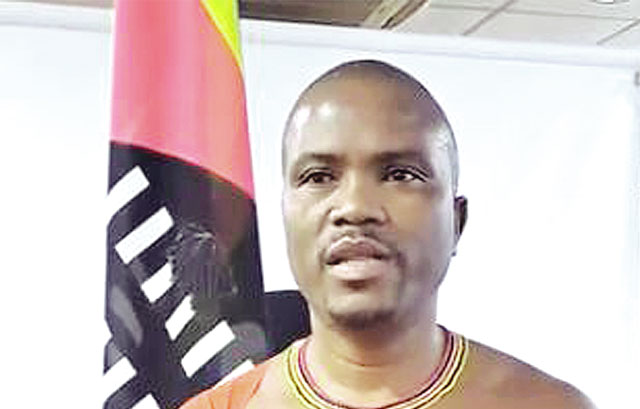By Futhi Dlamini | 2019-03-15

The Catholic Church in Eswatini is part of the worldwide Catholic Church, under the spiritual leadership of the Pope in Rome.
There are approximately 60 000 Catholics in Eswatini. The country forms a single diocese – the Diocese of Manzini. The main Sunday service is called Mass, and this is where we remember the command of Jesus to take bread and wine – “do this in memory of me”.
The priest repeats the Lord’s words, “This is my body, this is my blood,” and as Catholics, we believe that the bread and wine truly become the Body and Blood of Jesus. The wafer and the liquid don’t change their taste or appearance, but we believe that what they are in God’s sight has fundamentally changed.
No longer are they truly bread and wine, but rather the Lord’s own Body and Blood. For this reason, many churches also offer a kind of service called Adoration – the Body of Jesus is placed in a frame on the altar and members of the congregation come for silent prayer.
Many parishes offer a group where those considering becoming Catholic can gather together to learn more about the faith through conversations with the parish priest or a trusted instructor (catechist) from the local congregation.
Through these sessions, you will learn about the teaching of Jesus as the Catholic Church has received it: teaching about God and about who human beings are in God’s eyes; the moral principles which God asks his followers to live up to; the ceremonies of the Catholic Church in which we worship God, express sorrow for our deliberate wrongdoing, and seek God’s healing in times of sickness; and the different ways of praying which are part of the Catholic tradition.
The Catholic faith is rooted in the belief of the Trinity. These sets of beliefs are an expression of how God has related and revealed Himself to humanity through the ages. Through the years, the Christian faith has been formulated and the final expression of the faith is summed up in what was adopted in the 300s by the Bishops who had gathered in Nicea. The summation of these Christian beliefs is known as the creed, an account of who and what God is, and of what Jesus and the Spirit have to do with God.
"We believe in ..." believing-in means ultimately trusting what ultimately surrounds and enlivens us and our trusting—believing-in is also believing-within. It is not inferring the existence of something absent but awakening trustfully to the inescapably present. This is drawn from the Testament and from several philosophical schools of the time to interpret every finite, measurable thing as a manifestation of the infinite and immeasurable One within and beyond all things, "one God ... above all and through all and in all" (Ephesians 4:6).
"... one God, the Father, the Almighty, maker of heaven and earth, of all that is, seen and unseen." this means that the inescapably present power beyond and before all other powers, the power ultimately surrounding and enlivening us, our trusting, and everything else, is ultimately one and, most importantly, ultimately providing, like a parent, like the one Jesus called ‘Father.’ ‘For us there is one God, the Father, from whom are all things and for whom we exist’ (1 Corinthians 8:6). By the way, ‘almighty’ (Greek: pantokrator) actually means ‘leader of all,’ not ‘omnipotent’ or ‘all-powerful.’
"We believe in one Lord, Jesus Christ..." Believing-in Jesus as Lord also means believing-within Jesus. "For us … there is one Lord, Jesus Christ, through whom are all things and through whom we exist’ (1 Corinthians 8:6). To us Jesus was not just someone who had lived and died long ago, but someone who lives now in a way that, again, ultimately surrounds and enlivens us, our trusting, and everything else. We are indwelling Jesus' life, and Jesus' life is indwelling theirs. We also believe him to be the Christ, Israel's hoped-for anointed leader, who ‘conquered’ the occupying Romans not with an army but with a message and a newly enlivened community that the Romans could not conquer.
"... the only Son of God, eternally begotten of the Father, God from God, light from light, true God from true God, begotten, not made, of one Being with the Father; through him all things were made." This means that Jesus' all-embracing life is so intimately related to the ultimately parental power, God, that he could be called, not just God's only son, but, in a different way, God. The one power beyond and before all other powers has both a parental aspect and a filial (offspring-like) aspect. And Jesus' all-embracing life embodies this filial aspect. So instead of simply calling him God, we call him ‘God from God, light from light, true God from true God.’ Though Jesus' life had a beginning among us, the filial relationship he embodies has no beginning or end and is one with the ultimately parental power.
"For us and for our salvation" Webelieve that this fully human life of God-from-God was a response to our deepest human need. Our deepest need, we believe , is for unconflicted communion with God and one another in a way that fulfills our humanity instead of denying it. That communion becomes possible because God-from-God shares our humanity fully.
"He came down from heaven,was incarnate ... and became truly human"
We believe that God-from-God did not just show up disguised as one of us. God-from-God actually lived as one of us. Jesus was not an ‘avatar’ He was as human as everyone else. We believe that his divinity is inseparable from his humanity.
"... of the Holy Spirit and the Virgin Mary ..." As Matthew and Luke recount, Mary's pregnancy provoked scandalous rumours, the ultimate power at work here was the Holy Spirit. Jesus' scandalous birth, like his scandalous life and death, was the epitome of holiness. And his mother Mary's role in this was likewise scandalous but holy. Through an unwed pregnancy, Mary became ‘the God-bearer.’ These are the crucial theological points. Biological questions are a side issue.
"For our sake he was crucified under Pontius Pilate; He suffered death and was buried." We believe that Jesus' execution as God-from-God sharing our humanity even in its most conflicted state. God-from-God is not only rejected but killed by the powers that be. What would seem impossible—the death of the deathless God-from-God—happened. Instead of meeting our violent rejection of God with an even more violent rejection of us God-from-God is our ultimate victim.
“On the third day he rose again" We believe that Jesus' death, the death of God-from-God, did not finally end his life. Instead, it made him more alive, and more life-giving, than anyone could have imagined. Some of his first followers reported actually seeing him soon afterwards. According to the very earliest written testimony, his risen presence was embodied, but embodied spiritually, not physically, in a way that was life-giving (1 Corinthians 15:44-45). We therefore believe that Jesus was not just someone who had lived and died long ago but someone who lives now in a way that, again, ultimately surrounds and enlivens us, our trusting, and everything else.
"... in accordance with the Scriptures." We believe that Jesus' life, death and risen life were the ultimate spiritual meaning of every sacred writing (Luke 24:27).
"... He ascended into heaven and is seated at the right hand of the Father." Our belief in the ascension is based on the Gospels. We also understand that his being raised from death to the right hand of God "in the heavenly places" as one single event, not two events separated by a period of time (Ephesians 1:20). In the Gospels Jesus' first followers after the ascension stopped reporting about Jesus’ startling appearances of their risen Lord and started speaking more in terms of his ongoing spiritual presence making them members of his risen body. Jesus is no longer present as he once was—instead he is now present in a new way.
“He will come again in glory to judge the living and the dead, and his kingdom will have no end." We believe that Jesus, God-from-God, is no longer with us as he once was, that he is now with us in a new way, and that someday he will be with us and everybody else in a way that nobody can deny. That is, we believe that in one sense the reign of God had already arrived in Jesus, while in another sense it had yet to arrive. We picture this as the return of a conquering monarch, but we understand this to mean something that cannot be pictured—"the fullness of him who fills all in all," which is "above every name that is named, not only in this age but also in the age to come" (Ephesians 1:23, 21).
"We believe in the Holy Spirit, the Lord, the giver of life, who proceeds from the Father, who with the Father and the Son is worshiped and glorified, who has spoken through the prophets." Once again, believing-in also means believing-within. This was a way of acknowledging that while Jesus truly embodies God-from-God, Jesus does not exhaust God-from-God. The Spirit has been active from the beginning, breathing life into the world and inspiring truthful speaking.
The Spirit, so to speak, overflows the life, death and risen life of Jesus, making this unique, particular happening shareable with us and everything else. The Spirit ‘spells out’ the diversified unity and unified diversity between God and God-from-God. At this stage in the creed we are saying in effect that the unity of God is infinitely expressed and diversely shared. Through the Spirit, the bishops' own lives were diversely filled and surrounded by the uncontainable presence of the one God.
“We believe in one holy Catholic and Apostolic Church." Throughout the creed, but especially here, we draw heavily on Ephesians 4:4-6: "There is one body and one Spirit, just as you were called to the one hope of your calling, one Lord, one faith, one baptism, one God and Father of all, who is above all and through all and in all." The Church, Christ's gathered body, is constantly summoned to visible unity, holiness, universality (‘catholic’ means ‘universal’), and to continuity with the apostles who founded it. It's summoned to this because this is what it has already begun to be, thanks to its one life-giving Spirit, one embodied Lord, one all-empowering God above all and through all and in all.
"We acknowledge one baptism for the forgiveness of sins." Drawing up on Ephesians 4. Baptism, which literally means "immersion," is a rite by which any individual of any age could participate in God's own uniquely renewing immersion in the world. The rite is performed only once to signify unity.
“We look for the resurrection of the dead, and the life of the world to come." Our resurrection, like Jesus' resurrection, is a spiritual renewal of bodily existence beyond present boundaries. The resurrection of the dead actually begins with our participation in one baptism and continues beyond our last breath into the all-renewing life of the world to come.
This is our faith, this is the anchor of our faith. We relate and experience God in our lives in this way. It is through this expression of our faith that we have lived our lives through the ages.
share story
Post Your Comments Below

There is tension mounting between members of Parliament and their constituency headmen, who are n...

SOCCER - FOLLOWING the submission of the 16-team league proposal by elite league and NFD clubs, t...

Minister of Information, Communication and Technology (ICT) Savannah Maziya says there is a criti...
On Saturday One Billion Rising Eswatini held a mountain circle hike in partnership with the Proje...
All material © Swazi Observer. Material may not be published or reproduced in any form without prior written permission.
Design by Real Image Internet